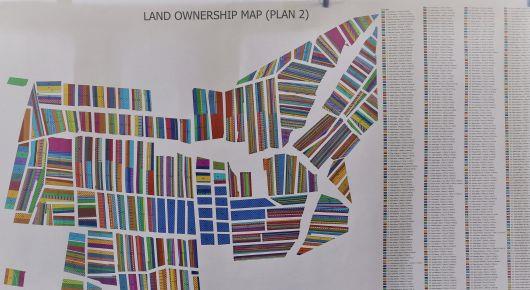Azerbaijan works towards consolidating fragmented land

In Azerbaijan, more people work in the agriculture sector than in any other. This sector also has huge influence on livelihoods in rural areas and impacts the reduction of rural poverty, which is among the main goals of the Azerbaijan Government.
The development of small and medium-sized farms into commercial family farms is, in many countries in the region, hampered by excessive land fragmentation. Today marks the conclusion of a three-year FAO undertaking to provide technical assistance to the Ministry of Agriculture of the Republic of Azerbaijan in introducing land consolidation in the country. The ultimate aim was to address structural problems in agriculture caused by land fragmentation, informal and not-updated land registry, and outdated agricultural infrastructure.
Today in several countries, agricultural lands are being consolidated for the purpose of increasing production and efficiency and, accordingly, ensuring the perpetuity of cropping. At the same time, land consolidation is used as an effective tool for sustainable rural development.
The final workshop held today in Baku brought together 45 participants from the Ministry of Agriculture, the State Committee on Property Issues, the Azerbaijan Amelioration and Water Management Open Joint Stock Company, local authorities, and famers. The main results of the project were presented, and participants shared experience and lessons learned during the implementation of the project and discussed concrete applications of the project findings and results for the future.
“Azerbaijan has clearly stepped on the road leading to improved farm structures,” said Morten Hartvigsen, delivery manager of FAO’s Regional Initiative on smallholders and family farms and the responsible officer for the project. “However, the country will need further international technical assistance to achieve the vision of scaling up land consolidation activities to a fully operational national programme.”
As a result of the project, a national land consolidation strategy, a state programme on land consolidation with an action plan, and a law on consolidation of agricultural lands were drafted and submitted to the Government for the further discussion and adoption.
In the initial stage of the project, a feasibility study was conducted in the pilot village, Shorsulu in Salyan region, where 89 percent of the total 608 land-owner families were interviewed about their land use, problems related to land ownership registration, and interest in participating in land consolidation through sale, purchase, exchange or lease agreements. A total of 88 percent indicated interest in consolidating their land parcels. Based on the outcome of the study, a re-allotment plan for the pilot village was drafted; after the law on consolidation of agricultural lands has been adopted, the plan can be fully finalized and implemented, and new land can be registered.
Four community workshops were organized to raise awareness on the benefits of land consolidation. In close collaboration with local partners, a community development plan was prepared for the pilot community, analyzing current needs and constraints. The plan focuses on the necessity of improved agricultural infrastructure in the village, including of introducing irrigation to parts of the village currently out of the irrigation scheme. In addition, the need for better passage over the main canal was identified and ultimately constructed, with the support of FAO.
29 August 2019, Baku, Azerbaijan
